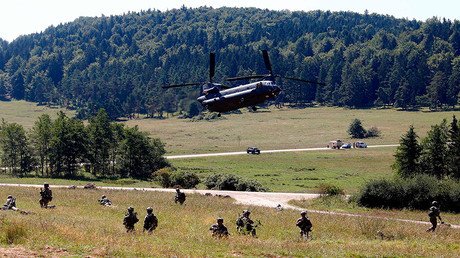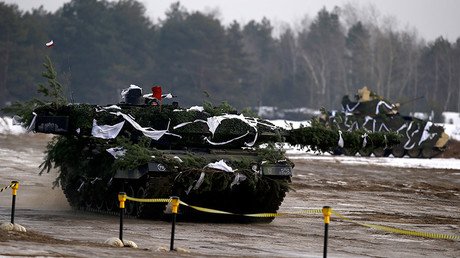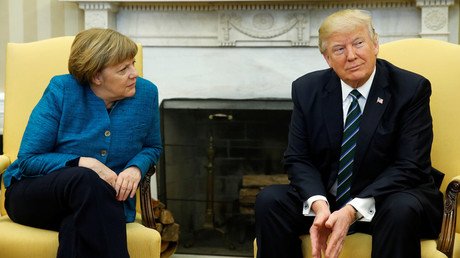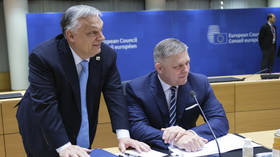Trump applauds Merkel’s ‘commitment’ to boost NATO spending
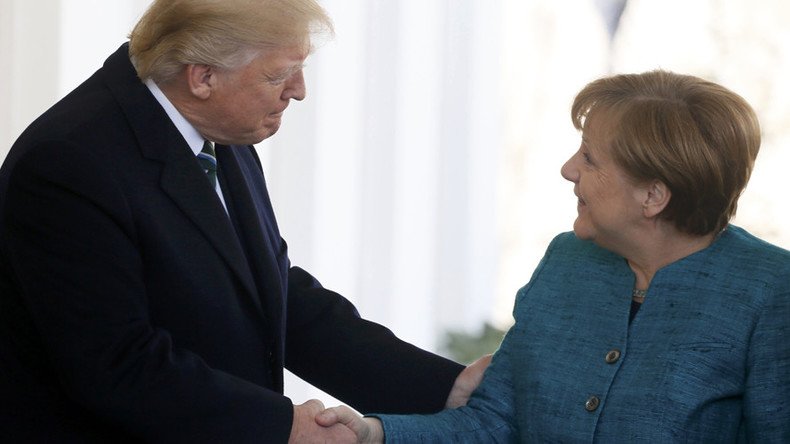
The German Chancellor has promised to do her best to spend what Donald Trump calls a “fair share” on NATO during her first official meeting with the new US President, despite such commitments somewhat contradicting some senior German officials.
NATO's finances featured high on the agenda during the first face-to-face meeting between Trump and Angela Merkel. Trump predictably restated his commitment to making all the allies pay their “fair share” of two percent of GDP to maintain the military alliance.
“I reiterated to Chancellor Merkel our strong support for NATO, as well as the need for our NATO allies to pay their fair share for the cost of defense,” Trump said at the joint White House news conference on Friday. “Many nations owe vast sums of money from the past years, and it’s very unfair to the US.”
Merkel was reassured that “NATO was of prime importance for the US” and promptly pledged to meet Trump’s demands and reach the spending target by 2024.
“I was gratified to know that the President underlined how important he thinks NATO,” Merkel said. “We committed to this 2 percent goal until 2024 we – last year we increased our defense spending by 8 percent, and we’re going to work again and again on this.”
Merkel has seemingly softened her stance on the spending issue and did not make mention of her idea to widen the definition of “defense” to somewhat dodge Trump’s demands.
“There’s no question we need to do more, but questions of development aid, crisis prevention and others are just as important,” Merkel said at a news conference in February. “My belief is we should all be aware of NATO’s value to us all.”
The change in Chancellor Merkel's tone is not very surprising, German academic, economist and professor Richard Werner believes.
“She’s very much used to getting her orders from the US, although, I suppose, she being used to clearer or a most of a singular line of instructions from the US,” Werner told RT.
“And at the moment she’s a bit confused, because she’s getting probably one set of arguments from her minders which are closely linked to the parts of the US, perhaps, President Trump is criticizing, and President Trump on the other hand. It’s not surprising that she will, in the end, do what’s being said from the US.”
While Merkel has apparently caved into US demands, some high-ranking German officials continue to show reluctance towards straightforward spending increases.
Ahead of Merkel’s visit to the US, Germany’s Defence Minister Ursula von der Leyen suggested revising the very principles of the alliance members’ spending — proposing an “activity index,” which would take into account participation in foreign missions.
More “active” countries, according to von der Leyen’s idea, should pay less, and those, reluctant to participate in actual military activities, should fork out more.
“For me, the question is who is really providing added value to the alliance,” told von der Leyen AFP.
Merkel however, appeared to ignore such arguments, which raises serious questions about Germany’s independence, Werner noted.
“She could have made a case that Germany has actually been doing quite a lot for the US, sending German troops to fight in US wars abroad,” Werner said. “Germany is a very unusual country because the question is whether it’s actually a country, or whether it’s just an occupation zone because apparently, the occupation status of 1945 is still on the books. And so, of course, the US has legally still a lot of power over Germany.”
Earlier this month, German Foreign Minister Sigmar Gabriel also questioned the feasibility of NATO’s spending quotas.
“I am concerned that politicians make public promises that they can't fulfill later on,” Gabriel said. “There is no apodictic 2 percent goal, but rather … we should be moving in that direction.”
Only five out of 28 NATO nations are currently hitting the two percent of GDP spending mark — the US, the UK, Estonia, Greece, and Poland.
The US is the biggest contributor, spending roughly 2.5 times more than the rest of the allies combined. Donald Trump vowed to change the situation during his election campaign, even calling the alliance “obsolete,” which caused anxiety among its European allies and fueled the idea of a separate EU army structure.
Some NATO countries, however, promised to swiftly increase spending to meet the demands. At least one more country, Romania, expects to meet the two percent mark in 2017.
Trump has meanwhile softened his rhetoric, clarifying that the alliance was only “obsolete” in terms of confronting modern threats like global terrorism and increasingly expressing “strong support” for NATO. The US President, however, seems to be equally committed to the idea of making the allies actually foot their bills.
